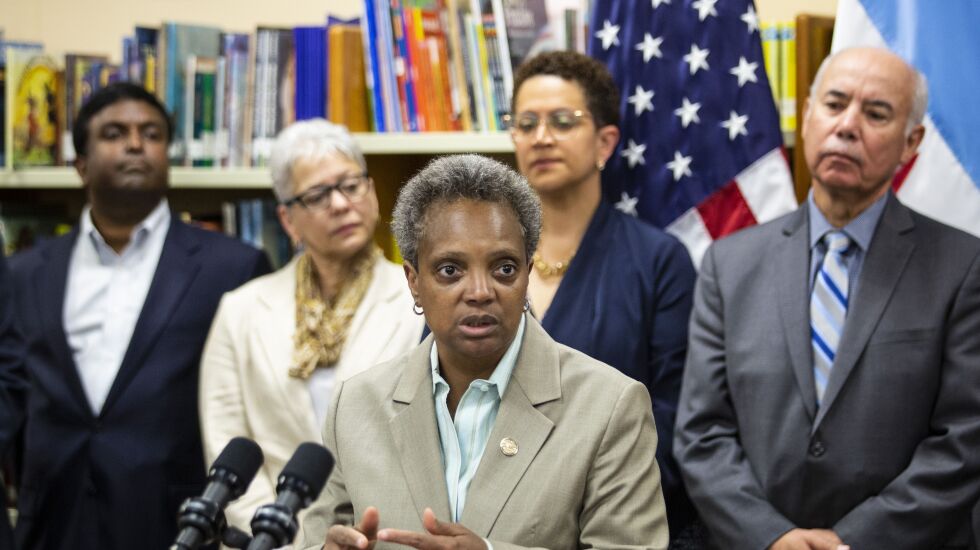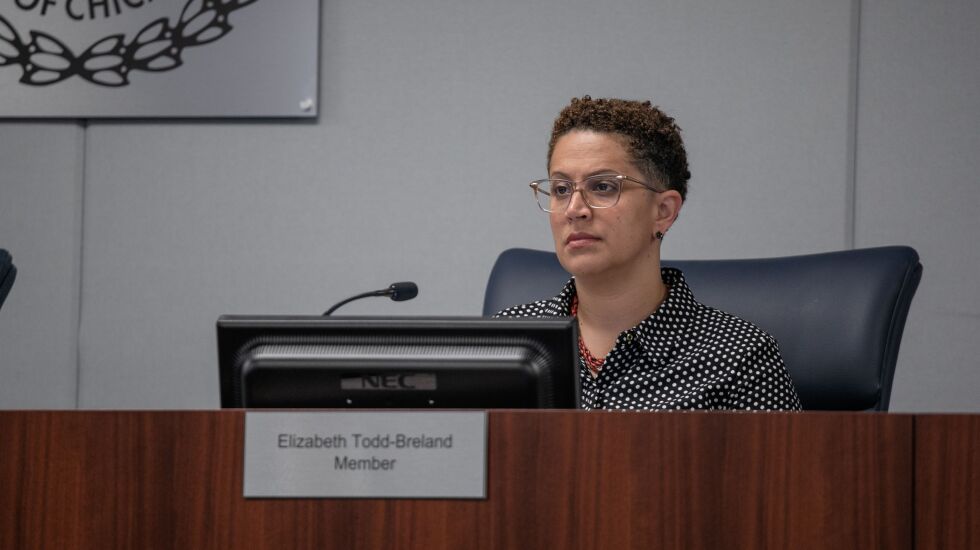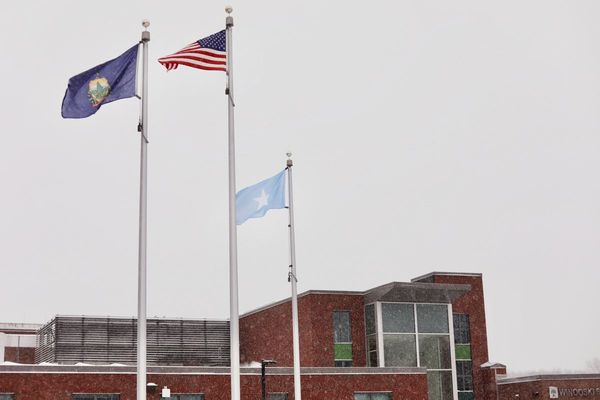
When newly elected Mayor Lori Lightfoot named seven people in 2019 to oversee the Chicago Public Schools, she said her Chicago Board of Education would be very different from past boards.
It would be an independent body composed of people with deep roots in the school system — educators, CPS parents, school activists, not the bankers and corporate lawyers past mayors had appointed, and the work it would do to reach its decisions largely would “have to be in public.”
“I don’t want a rubber stamp,” the new mayor said in June 2019, fresh off a landslide victory for what would be her lone term as mayor. “Nobody wants a rubber stamp that undermines legitimacy. They are there to ask tough questions.”
But Lightfoot’s promise to depart from past years’ practice of mayoral control didn’t hold up over time, according to a Chicago Sun-Times examination of the 2,048 votes taken at 58 board meetings between June 2019 and May, when Mayor Brandon Johnson took office.
Johnson has replaced all but one of Lightfoot’s seven Board of Ed members, who bucked her will just twice in those four years of votes.
All but 24 of the items that came up for a vote by Lightfoot’s board were unanimously approved. That’s a 99% passage rate with 98% unanimity. A rubber stamp?
“It wasn’t,” says Miguel del Valle, a former state senator and CPS grandparent chosen by Lightfoot to chair her school board.
“The district staff was so used to rubber-stamping,” says Amy Rome, a Lightfoot Board of Ed member and former CPS principal who cast five “no” votes. “The mayor would call and say, ‘You‘re making my life hard by dissenting.’ I wasn’t being contrary to be contrary. There were things I thought were not good for kids and not good for adults working in the system.”
Several times, the board’s scrutiny of proposals from top CPS central office administrators resulted in revisions or delayed passage, she says.
Until the end of Lightfoot’s tenure, though, when that happened, it did so during closed-door briefings before the Board of Ed allowed the public in.
Former board members point to these instances in which they dissented with Lightfoot:
- They voted to change the name of CPS’ October holiday from Columbus Day to Indigenous Peoples Day.
- They canceled the firing of two Southeast Side teachers.
- They stalled the building of a new $120 million Near South High School. That happened after the Sun-Times and WBEZ reported that senior CPS officials had privately warned city officials the project could undermine nearby Black-majority schools. It also followed Lightfoot’s dumping and replacing one board member who opposed the project.
“I hope this current board is as independent as our board was,” del Valle says. “I think it’s healthy for the system. And it’s the way it’s supposed to work. That’s why you have a board, whether it’s elected or appointed. They deliberate, and then they make decisions based on what should be in the best interests of students.”
But Lightfoot and her aides often pressured the Board of Ed to vote the mayor’s way on key matters, CPS sources told the Sun-Times — like the push last year, ahead of the mayoral election, to build the Near South Side high school. Though those measures faced delays, they ultimately were approved, as Lightfoot wanted.
But Lightfoot’s board tried, as she promised, to be more open to the public, del Valle says. He points to his first meeting, in June 2019, when the board took steps to make the meetings more convenient for the public. It moved public participation earlier in the meetings, so people who’d signed up to speak wouldn’t have to wait all day for their turn.
The board also started livestreaming its meetings long before the COVID-19 pandemic shut schools down, so people could watch online.
Pre-pandemic, Lightfoot’s board also moved some meetings from daytime sessions at CPS’ Loop office to evening meetings at high schools around the city.
But the pandemic also prompted the school board to chop the number of speakers allowed at each meeting from 60 to 15 during COVID. That number was raised to 30 in August 2020 and now allows for 60 total at meetings and public briefings.
Twelve people rounded out the board as members finished terms and weren’t reappointed. The lone holdover to Johnson’s appointed board is Elizabeth Todd-Breland, an original Lightfoot choice, now the board’s vice president.

Todd-Breland, a University of Illinois Chicago history professor, was the Lightfoot administration’s biggest critic on the board. She went against the mayor’s wishes 17 times — nearly twice the nine times that Sendhil Revuluri, the next-highest dissenter, did.
Del Valle voted no once in four years. Four of the later appointees never voted no.







